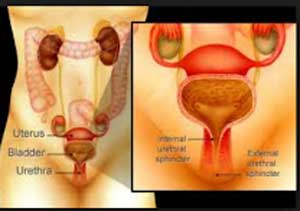- Home
- Editorial
- News
- Practice Guidelines
- Anesthesiology Guidelines
- Cancer Guidelines
- Cardiac Sciences Guidelines
- Critical Care Guidelines
- Dentistry Guidelines
- Dermatology Guidelines
- Diabetes and Endo Guidelines
- Diagnostics Guidelines
- ENT Guidelines
- Featured Practice Guidelines
- Gastroenterology Guidelines
- Geriatrics Guidelines
- Medicine Guidelines
- Nephrology Guidelines
- Neurosciences Guidelines
- Obs and Gynae Guidelines
- Ophthalmology Guidelines
- Orthopaedics Guidelines
- Paediatrics Guidelines
- Psychiatry Guidelines
- Pulmonology Guidelines
- Radiology Guidelines
- Surgery Guidelines
- Urology Guidelines
Antibiotics benefit women suffering from recurrent cystitis or chronic bladder pain

Up to 1.4 million British women suffer from long-term bladder pain and urinary problems. Many clinicians believe that the condition known as interstitial cystitis or painful bladder syndrome is caused by inflammation when nerve endings in the bladder become over-sensitized, rather than bacterial infections.Dr.Sheela Swamy of University College London in the UK alond with her colleagues has conducted a new clinical study and found that Women suffering from recurrent cystitis or chronic bladder pain could benefit from a long-term course of antibiotics.In other words, Antibiotics can successfully help rid a patient of chronic urinary tract infection symptoms. The finding of study has been published in the International Urogynecology Journal by Springer.
The diagnostic tests for urinary tract infections are often inaccurate and fail to detect many different strains of bacteria that can cause infection. As a result, patients are often advised to manage their condition through measures such as bladder instillations, surgical interventions and certain medications.
Swamy and her colleagues analyzed the case studies of 624 women collected over the course of ten years at the Lower Urinary Tract Symptoms Clinic at the Whittington Hospital. This outpatient facility in north London is the only clinic in the UK specialising in treating chronic urinary tract infections.
Before starting the treatment, most of the patients had on average already suffered their symptoms for more than six years, with no treatment having brought relief. The patients were treated with a full dose of first-line, narrow spectrum oral antibiotics such as cefalexin, nitrofurantoin or trimethoprim, along with the urinary antiseptic Hiprex. All patients who had completed their treatment were also given back-up antibiotics to use at home at the first indication of their symptoms resurging. This approach was followed to prevent new infection becoming chronic because the bladders of patients who have suffered a lot of urinary tract infection are less able to fight off bacteria.
Antibiotic treatment was associated with significant reductions in patients' urgency, pain, frequency and voiding symptoms, and a decrease in the pyuria (white blood cells) and urothelial cells that are markers of bladder inflammation.
Overall, 64 percent of the women reported that their symptoms were very much better, with another 20 percent reporting that they were much better. In many cases, it took more than a year and more than one cycle of treatment for patients' symptoms to resolve, and before they could stop taking antibiotics completely. Checks for emergent antibiotic resistance were carried out but no increase was observed.
"Oral antibiotics are an effective treatment for chronic urinary tract infections and support the idea that the symptoms are caused by bacterial infections," says Swamy, who sees the findings as an important step towards the development of effective treatment for this condition. "These results provide preliminary data to inform further randomized control trials."

Disclaimer: This site is primarily intended for healthcare professionals. Any content/information on this website does not replace the advice of medical and/or health professionals and should not be construed as medical/diagnostic advice/endorsement or prescription. Use of this site is subject to our terms of use, privacy policy, advertisement policy. © 2020 Minerva Medical Treatment Pvt Ltd